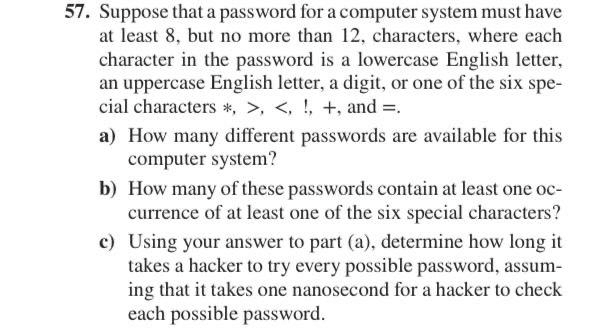
Sia

Question
Computer Science
Posted almost 2 years ago
57. Suppose that a password for a computer system must have
at least 8, but no more than 12, characters, where each
character in the password is a lowercase English letter,
an uppercase English letter, a digit, or one of the six spe-
cial characters *, >, <. !, +, and =
a) How many different passwords are available for this
computer system?
b) How many of these passwords contain at least one OC-
currence of at least one of the six special characters?
c) Using your answer to part (a), determine how long it
takes a hacker to try every possible password, assum-
ing that it takes one nanosecond for a hacker to check
each possible password.

Answer from Sia
Posted almost 2 years ago
For the math word problem about password combinations:
Key Concept
Combinatorics and Exponential Growth
Explanation
The number of different passwords can be calculated using combinatorics, considering the length of the password and the number of possible characters for each position.
To solve part a, we need to calculate the total number of passwords for each length from 8 to 12 characters and then sum them up. Each character can be a lowercase letter (26 possibilities), an uppercase letter (26 possibilities), a digit (10 possibilities), or one of the six special characters, giving us a total of possible characters for each position.
The number of different passwords of length is . Therefore, the total number of different passwords is the sum of passwords of length 8 to 12:
For part b, we calculate the number of passwords that do not contain any special character and subtract it from the total number of passwords. The number of such passwords of length is (since we only use letters and digits).
For part c, we use the total number of passwords from part a and multiply by the time it takes to check one password (one nanosecond).
The actual calculations would require a computer or a calculator due to the large numbers involved.Not the question you are looking for? Ask here!
Enter question by text
Enter question by image
Unlock Smarter Learning with AskSia Super!
Join Super, our all-in-one AI solution that can greatly improve your learning efficiency.
30% higher accuracy than GPT-4o
Entire learning journey support
The most student-friendly features
Study Other Question